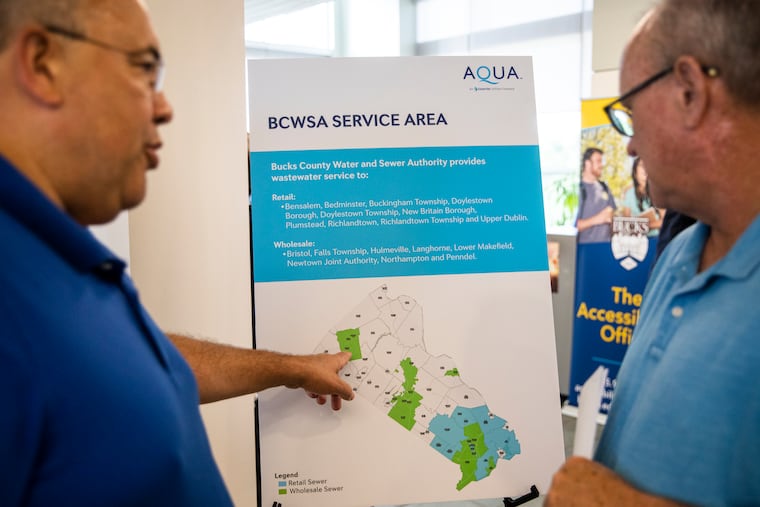Municipal water system sales leave customers stuck with the bill | Editorial
Since Act 12 was approved by the Pa. legislature eight years ago, for-profit companies have bought more than 20 water and sewer systems. Some customers have seen their monthly bills double or triple.

In 2016, Pennsylvania lawmakers passed a measure known as Act 12 that was sold as a way for municipalities to off-load public water and sewer systems in urgent need of repair at a fair market price.
But Act 12 mainly paved the way for for-profit companies to pad their bottom line by gobbling up well-run utilities and imposing exorbitant rate hikes, leaving customers stuck with hefty bills and nowhere to turn.
Since Act 12 was approved, mainly two for-profit companies — Pennsylvania American Water and Aqua Pennsylvania — have purchased more than 20 water and sewer systems. In many instances, customers have seen their monthly bills double or triple. Rates increased by 98% in Limerick Township, 90% in New Garden, and 73% in East Norriton.
The rate hikes have spurred a backlash from customers. Bucks County called off a proposed $1.1 billion sale of the county’s sewer system in 2022 following fierce public opposition.
In 2023, the Pennsylvania Commonwealth Court stopped the $54.9 million sale of the East Whiteland Township sewer system to Aqua Pennsylvania after effectively finding the public benefit did not outweigh the harm of the transaction.
» READ MORE: As Pa. municipalities sell water systems to for-profit companies, consumers are left paying the price | Editorial
Undeterred by past rate increases or the customer backlash, Pennsylvania American Water requested a rate hike in November of up to 32% for homes and businesses. The request came less than a year after the company’s last increase went into effect.
The state Public Utility Commission paused the proposed increase to allow time for further investigation. Meanwhile, some Democratic lawmakers have put forth several different bills to try to reform Act 12.
While the measures are well intended, none of them will solve the problem. The only solution is to repeal Act 12, a step that was suggested by this Editorial Board in 2022.
Fortunately, State Sen. John Kane, a Democrat who represents parts of Chester and Delaware Counties, gets it. He introduced a bill last year to repeal the measure. “Act 12 has been a disaster for ratepayers from the very beginning,” Kane wrote in a memo that said the law created a “predatory pricing scheme” that has left customers “holding the bag.”
How have the for-profit companies responded to the backlash? By doing what big businesses often do to get what they want in Harrisburg: beefing up lobbying and boosting campaign contributions.
Pennsylvania American Water — a subsidiary of American Water Works Co. — tripled its lobbying expenses last year to $438,000. Aqua Pennsylvania and its parent company, Essential Utilities Inc., spent $650,000 on lobbying in 2023, up slightly from the previous year but up 50% from 2021, The Inquirer reported.
Political action committees affiliated with both companies have also ramped up campaign donations. Essential Utilities’ PAC contributed $345,000 to Pennsylvania political committees from 2021 to 2022, up from $212,000 in 2020. A PAC affiliated with American Water gave Pennsylvania groups $189,000 in the 2021-22 cycle, up from $133,000 the previous cycle, records showed.
Lobbying and campaign contributions have long been the grease that keeps Harrisburg running. But how long will lawmakers allow the for-profit water companies to take advantage of consumers who have no say in the utility sales and no place to go when bills come due?
» READ MORE: It’s time to repeal the Pa. law that allows the sale of municipal water systems | Editorial
James H. Cawley, an attorney who was a commissioner on the Pennsylvania Public Utility Commission from 1979 to 1985 and again from 2005 to 2015, described the stakes in powerful written testimony submitted to the PUC last month.
He said the section in Act 12 that opened the door for the sales and subsequent rate hikes was “a corruption of public utility rate-making in Pennsylvania.” Cawley said the 2016 change in the law was “contrary to the fair balance and public interest emphasis of the Public Utility Code.” He added that the measure created “the most pro-utility, anti-customer provision ever added to Pennsylvania’s public utility laws.”
Cawley said Act 12 was “misleadingly sold to the legislature as a necessary incentive for large water companies to acquire distressed and impoverished municipal water systems.” But that has not happened. Instead, Cawley wrote, “only healthy and well-managed” systems have been purchased.
The result has been disastrous for Pennsylvania consumers. The sales have “caused extreme rate increases” for customers, Cawley said, “approaching $100 million annually, with much more to come if left unchecked.”
Act 12 has been a policy failure from the start. It is past time for Harrisburg lawmakers to right this wrong.